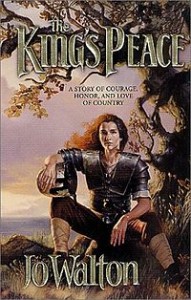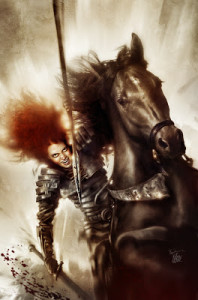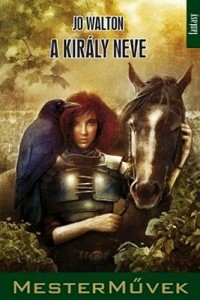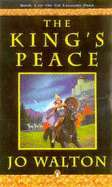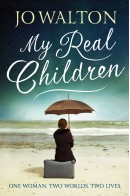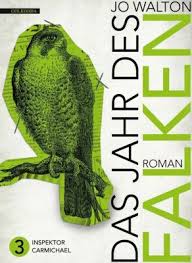The King’s Peace was my first published novel. It came out from Tor in North America in 2000 and has been published as an e-book by Corsair in the UK in 2013. There was also an Australian edition by Penguin Australia, and it was published in German, Dutch and Hungarian.
The King’s Name came out from Tor in 2001, and as an e-book by Corsair in 2013. It also had Australian, German and Dutch and Hungarian editions.
The King’s Peace and The King’s Name make up one whole thing, which should probably be thought of either as one book or three, but was published as two for publishing reasons. It’s a retelling of King Arthur in an alternate sixth century Britain that’s considerably more historically accurate than you’d probably expect. It has a magic system that I put a lot of thought into integrating into the world. It’s told from the first person point-of-view of Sulien ap Gwien, an armiger in the service of King Urdo. She’s a jock, and not only that but she’s not very good at emotions and about as asexual and aromantic as people get. I enjoyed writing her voice, but it’s difficult sometimes with an unreliable narrator and I learned a lot about how to make that work while writing this.
I was interested in playing with the Celtic Arthurian stuff, and also dealing realistically with the influx of Saxons into sub-Roman Britain. By making it a different world I both got to have women with a feudal obligation to fight and was able to do things with making the events thematic rather than accurate — I wasn’t locked in to history. But the books owe at least as much to archaeology as anything else.
The amazing thing about this Hungarian cover, is that I can immediately tell exactly what scene in the book it’s illustrating!
I wrote The King’s Peace between April 1997 and December 1998. I wrote the first four chapters in Lancaster and the rest in Swansea. I wrote pretty much all of it except the battle of Caer Lind before 8am in the morning. I wrote The King’s Name in 1999, in Swansea, again mostly before 8am.
Goodreads page.
FAQ
Q. How do you pronounce “Sulien ap Gwien”?
A. Sulien is three syllables. Soo-lee-en. Sue-li-en. Ap is just like “tap” without the T. “Gwien” is like someone lisping “Green” to “Gween” except the end is the same “ee-en” as “Sulien” “Gw-ee-en”. Or however it suits you.
Q. How do you pronounce all these other names? Where do they come from anyway?
A. Tanagan words are kind of Old Welsh, not so much anglicised as fantasyized for ease of pronunciation, so they don’t quite work with Welsh rules any longer. A lot of the way I’ve done the names comes from looking at Latin names for Celtic tribes and places and considering what was done to put them into Latin and then trying to take them out again. The real world equivalent of Sulien’s period was a time where Old Welsh was emerging from the original Brythonic spoken in Britain after it had been highly influenced by Latin. If you look at Latin words like “ecclesia” and Welsh words like “eglwys” (both meaning “church”) you can see how the languages work together to do odd things and come up with an in between version that English speakers can get their tongue around. It’s also the process that gets “Fortriu” out of “Verturiones”. (If you find this interesting, you might be interested in the late Prof. Kenneth Jackson’s work on the subject.)
Vincan is, of course, just straight Latin.
Jarnish is just Anglo-Saxon and all Jarnish names are real A-S ones, (or occasionally Norse) but sometimes with spelling tweaked in favour of pronunciation. (Frex Ayl rather than Aelle.)
The few Malmish names in the novel are Visigothic but tweaked for being spoken in a mostly Vincan/Tanagan country. Marchel’s name is not actually Malmish but an adopted version of the Vincan Marcella, where the “c” had already, in Narlahena, softened into the Italianate “ch”. I didn’t make this up at all, there’s a Caer Marchel in Powys which is named after someone who got their name in precisely this way. I am indebted to John Morris’ The Age of Arthur for drawing my attention to this and giving me the idea for the character.
The names are supposed to be easy to say. If you don’t find that they are, why don’t you just say them the way you want? That’s fine by me.
Q. But I want to say them properly! How do I do that?
A. Well, for Tanagan names, C, G, and Ch are always hard, like Candle, Grape, and Bach, or Loch. “Ch” is hard in every name instance in the novel except for Marchel and Chanerig. R is rolled. I don’t think there are any other useful general guidelines. If you can’t pronounce anything specific, email me.
Q. What does it mean “the inspiration that came from a game”? Was it all a roleplaying game and you wrote it down?
A. No. None of the plot or world of The King’s Peace was ever part of a RPG. It’s complicated though. There was once a Prince Valiant game produced by Chaosium, in which I ran a complicated Arthurian campaign. It was very Malory, all quests, but with some of the Welsh stuff threaded into it — the death of Llachau especially. There are two things that came out of that game and into my conception of the story. The first is Sulien herself, who started to be defined in the game, especially such things as her attitude to sex, which developed in play as a contrast to the way one of the other female characters was very flirtatious and sexual. The other was the character of Morthu, who is very closely based on Jez Green’s Mordred, who smiled and smiled and was a villain. There is even one line in the book which is one that Jez used in the game. (Bet you can’t guess which.) Otherwise there’s nothing, no other characters, no situations, not the world, and certainly no plot overlap.
Q. You do write RPGs though, don’t you?
A. Sure. I co-wrote GURPS Celtic Myth which is back in print from Steve Jackson Games, and Realms of Sorcery for WFRP from Hogshead games, and I’ve written a whole pile of bits and pieces. Writing fiction is more fun and pays better, so I’m not planning to write any more RPGs in the near future unless someone asks me nicely and pays me lots.
Q. If I like The King’s Peace what else will I like reading?
A. That depends what you liked about it.
Kind of “Doing Things With History” Fantasies
Peter Dickinson The Blue Hawk
Guy Gavriel Kay’s The Lions of Al Rassan, The Sarantine Mosaic, Tigana and A Song for Arbonne
Rudyard Kipling Puck of Pook’s Hill and Rewards and Fairies
Jill Paton Walsh Knowledge of Angels
Kind of Celtic/Saxon/Roman Fantasies
Poul Anderson The Broken Sword
Marion Campbell The Dark Twin
Alan Garner Red Shift and everything else.
John James Not For All the Gold in Ireland and prequel Votan and .
Katherine Kerr Daggerspell and sequels.
R.A. MacAvoy The Book of Kells.
Ian McDonald King of Morning, Queen of Day.
Nicola Griffith Hild.
Kind of Arthurian
Gillian Bradshaw’s Down the Long Wind also published in three volumes as Hawk of May, The Kingdom of Summer and In Winter’s Shadow. The first two are mostly about Gwalchmai and the third is mostly about Guinevere.
Mary Stewart’s Merlin books. I like the first two The Crystal Cave and The Hollow Hills a lot.
John M. Ford’s Arthuriana in the collection Time Steps
Good Historical Novels
Gillian Bradshaw The Lighthouse at Alexandria, Island of Ghosts and others, but these two in particular deal really wonderfully with the late Roman Empire.
Alfred Duggan The Little Emperors and others.
Dorothy Dunnett King Hereafter
, The Lymond Chronicles and The House of Niccolo.
Robert Graves I Claudius, Claudius the God, Wife to Mr Milton, Count Belisarius.
Patrick O’Brian Master and Commander and everything else.
Mary Renault The King Must Die and everything else.
Georgia Sallska Priam’s Daughter
Helen Waddell Peter Abelard
Things Written In First Person Retrospective
Mary Renault The Mask of Apollo, The King Must Die, The Persian Boy and others.
Robert Heinlein The Moon Is a Harsh Mistress and Double Star.
Raphael Carter The Fortunate Fall.
Gail Godwin Father Melancholy’s Daughter and others.
Robert Graves I, Claudius and others.
Mary Stewart Merlin books
Marge Piercy Braided Lives.

